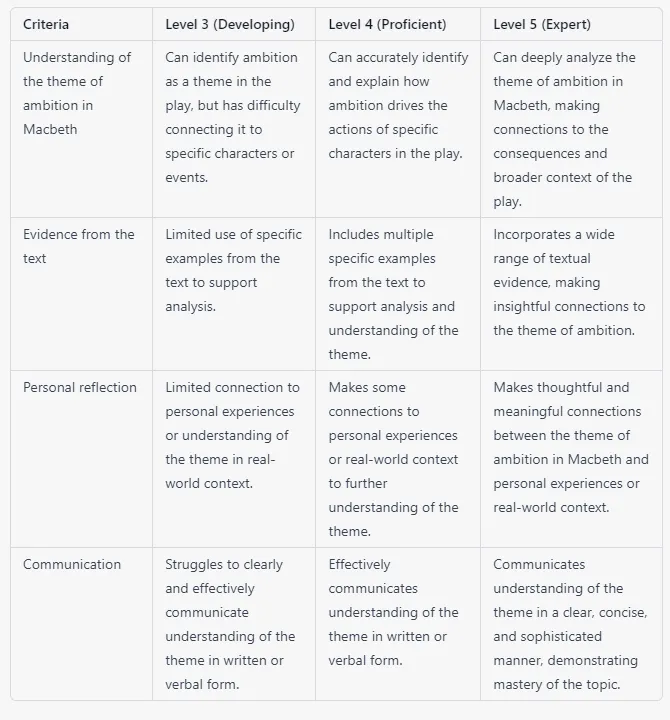If I was a curator on HIVE, I'd be taking notice of Chat GTP and the authenticity of writing here now that this AI language tool is here. In fact, there isn't a profession that shouldn't be taking notice of it, and as the school term begins, many teachers are talking about it's capabilities. Much to my shock, the principal at Jamie's school hadn't even heard of it, but she didn't realise that vaping was a problem either, which says a lot about her cabilities.

A quick play this morning and we have got it to write, in a less than a minute over coffee:
- a lesson plan on Newton's Universal Law of Gravitation
- a 200 word analysis of symbols in To Kill a Mockingbird
Problems?
Yes, but nothing that couldn't be overcome by redefining the parameters so the AI knows exactly what you want. It does take some skill and practice, but by the end of this blog post I was getting some quite good responses, from essays to lesson plans, creative writing, poetry and more. I even got it to write a reasonable rubric.
Thinking back to being in the English classroom, there's a definitely things I'm not overly concerned about, and a way to use Chat GTP as opportunity. There's no way English teachers are going to ignore it, and I don't doubt there will be much discussion, analysis of criticism and media analysis on this new and world changing technology.

To begin with, students need a degree of literacy to use it. I used to watch students struggle with searching for things on Google most of the time, and that tech has been around forever. Using specific search terms is something we have to teach, and often, to save time, I find information for students before the lesson is over and no work has been done at all. To use Chat GTP adequately, high school students would have to be taught how to use it. The top students might be that clever, but the top students don't need to cheat.
For example, 'write a 200 word analysis on 'x' text' is fine, but unless they add modifiers such as 'add quotes and examples from the text', their work would not get higher than a C, perhaps a B, if it was particularly well executed. A student who usually writes at a lower standard would be immediately flagged for writing something in the way CHAT GTP is capable of, and monitored closely for cheating.
Students would also have to memorise an essay before a handwritten, timed exam, and know the answer to the question first. They would have to ensure they adhered to the criteria they would be marked upon.
For example, when I asked it to 'write an introduction to an essay on 'Lord of the Flies', it arrived at this:
In the novel "Lord of the Flies," William Golding explores the inherent evil of human nature through the story of a group of boys stranded on an uninhabited island. As the boys struggle to survive and govern themselves, they begin to lose their sense of morality and civilization, ultimately descending into savagery. Through this gripping tale, Golding raises important questions about the nature of society and the potential dangers of mob mentality. The novel, first published in 1954, remains a classic of modern literature and continues to be widely read and studied today.
Not bad. however, 'gripping tale' and the publication date, as well as the fact it's widely read and studied, are irrelevant to the criteria and superfluous. It is also general, sweeping over the main themes. I would comment that the student needs to closely answer the question - however, as English essays in senior classrooms here are given on the day and not beforehand, the student would be hard pressed to know what the question was about.
If the question was 'How does Golding create a sense of foreboding in the novel', this introduction would not answer the question at all. Better, though, if you know the question:
In the novel "Lord of the Flies," William Golding masterfully creates a sense of foreboding and tension that keeps the reader on edge throughout the story. Through the use of imagery, symbolism, and characterization, Golding paints a picture of an uninhabited island that is both beautiful and dangerous, and a group of boys who are struggling to survive and maintain their sense of morality. The novel raises important questions about the nature of society and the potential dangers of mob mentality. In this essay, we will explore the various literary techniques that Golding uses to create a sense of foreboding in "Lord of the Flies" and how they contribute to the overall impact of the story.
Still, 'keeping the reader on edge' is informal vocabulary, the introduction is far too long (they still have a whole essay to write in an hour) and it is a little repetitive, with superfluous lines. No 'short,precice, succinct' as I would advise students sitting VCE assessment here in my home state in Australia.
Can CHAT GTP used positively in the English classroom?
Without a doubt, new and concerning technologies can be used in positive ways in the classroom.
It's quite fun to get the Chat GTP to 'write a poem based on the theme of' or a poem based around an event, a character or chapter. A ten line poem on Macbeth?
The ambition, it burns like a fire
It drives Macbeth to his desire
He longs for power, and a crown
And will do whatever it takes to get them now
But the cost is high, a steep price
As he commits murder, twice, thrice
His ambition, it clouds his mind
And leaves him alone, in a state of grind
In the end, he loses it all
And his ambition, leads to his fall.
Of course, another opportunity to question and assess. What is a 'state of grind' and does this apply to the play? How many people does he kill exactly? Does the AI do a good job at summarising the play? What is left out?
Another lesson could be to expand on something the CHAT GTP has begun. For example, 'write about a haunted house in 50 words'.
The haunted house on Elm Street was infamous for its eerie noises and strange shadows. Locals whispered about the malevolent spirits that lurked within. Brave souls ventured inside but were driven out by ghastly sights and sounds. Empty now, the house still holds a malevolent presence, waiting for its next victim.
Students could:
- assess the response according to the set criteria
- list verbs, adverbs, nouns
- define unknown or difficult words eg infamous, malevolent
- pair up and get students to suggest a way in which this passage could be expanded upon, for example: desscribe a local's experience in the house, use three sentences to describe the noises in the house.
- after doing so, they could ask it to complete the activity itself and then compare to their own response. In what ways are they similiar/different? How might the Chat GTP be improved upon? In the below example, I would think that students would immediately identify that the repetition was unnecessary.
- Students could then rewrite the passage with their own improvements.
The ghastly sights and sounds inside the haunted houseon Elm Street were said to include ghostly apparitions that appeared out of nowhere, blood-curdling screams that echoed through the halls, and strange, unearthly noises that seemed to come from within the walls. Some reported seeing furniture move on its own, and others claimed to have been touched by unseen hands. The air was said to be thick with the stench of rotting flesh, and the shadows seemed to shift and writhe in an unnatural way. Some people even claimed to have seen ghostly figures of previous occupants who had met a tragic end within the house.The ghastly sights and sounds were so terrifying that many who ventured inside were too scared to ever return.
Arguably, students need a degree of literacy to do any of the above tasks. A higher level literature classroom would have no problem and perhaps find the task exciting, yet a lower level class who struggled with literacy might not be able to understand the task or struggle to read the content and identify it's failings according to set criteria.
An opportunity for critical thinking
One of the main opportunities that has been flagged for negotiating this AI in the education is around critical thinking. In my experience, education has removed critical thinking in favour of producing generic responses that get good marks. Students are often worried about making their own assessment or judgement of literature in favour of the 'right' answer in study guides. As English teachers and assessors, we are looking for work that questions, interprets, evaluates. How might education take this opportunity to design assessments that are outside the realm of ChatGTP and still show understanding and assessment of texts?
I have long argued for a portfolio assessment in the English classroom, extending over the term where the students write various responses to the text based on their own interests, and with close conversation with the teacher about their thought processes. If essays can be written by AI, how might assessment change so that it assesses the human response?
An opportunity to save time
Teachers are always time poor and overworked. Whilst experienced teachers could create a lesson plan in their heads on the way to the classroom, sometimes creativity can be lacking or newer teachers are stuck for activities.
I wrote 'write a lesson plan on the theme of ambition in macbeth' and it was pretty good. There were bits I would remove that I don't think would work very well or be too time consuming but it was a good start. Clearly, a lesson plan is only as good as the teacher who critiques, adapts and uses it, so I can't see the Chat GTP replacing teachers just yet in all areas!

I can't even imagine how time saving this would be - to me it's mind blowing. Here, I got it to write a table rubric assessing the student's ability to understand the theme of ambition in Macbeth. Any good English team would sit and edit this to make sure it worked, but have you any idea how long even STARTING a rubric can take?

This is an absolute game changer.
It's here to stay
The Pandoras box has well and truly been opened. It's been coming for a long time, and any teacher who hasn't been thinking about how to approach it will find themselves threatened and worried.
Education has a great opportunity to embrace this new technology and well as talk to students about what it actually means for their ability to navigate the adult world in terms of their careers and even their intelligence.
Interesting times.
Oh, and it even wrote me a school report for someone who is lazy and needs to do homework:
Student John Doe is struggling in English class due to lack of motivation and poor study habits. The main issue identified is his lack of effort in completing homework assignments and participating in class discussions. Despite multiple reminders and opportunities for extra help, John has consistently failed to hand in homework assignments on time and has not been actively participating in class. This has resulted in a lack of understanding of the material and poor performance on quizzes and exams. To improve, John needs to take more responsibility for his own learning and start taking active steps to improve his performance, such as completing homework assignments on time, actively participating in class, and seeking extra help when needed.
Interesting times.
If you're a teacher, are you worried about CHATGTP in the classroom? Have you used it yet or discussed it with your students? If you're not an educator, have you used it yet? To what degrees of success? How do you feel about this AI?
Creepy images of the English classroom co-created by me with Midjourney AI. For the record, my classroom never looked like this.
With Love,

Are you on HIVE yet? Earn for writing! Referral link for FREE account here
